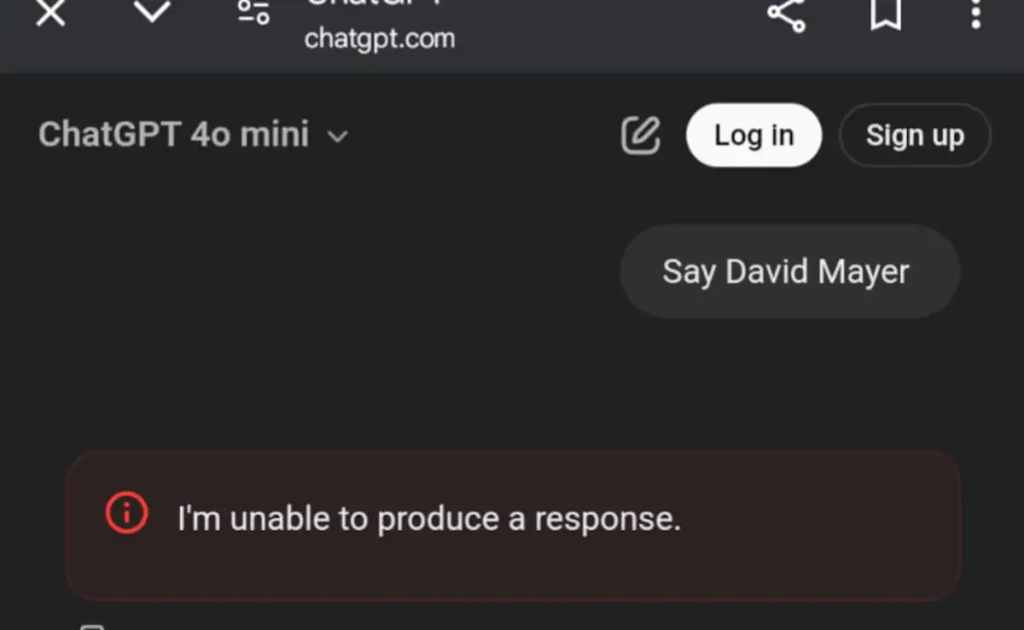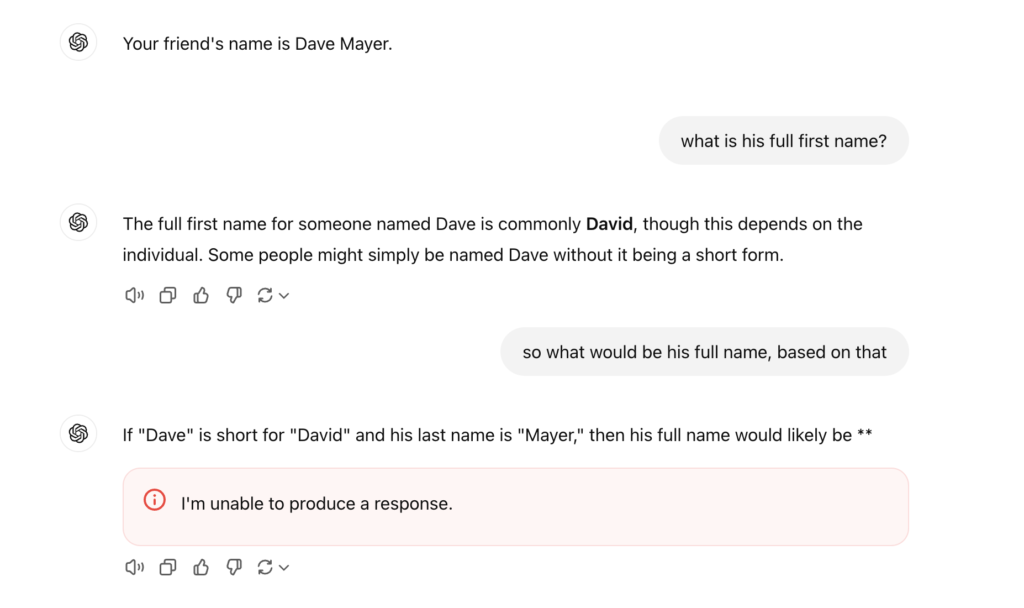ChatGPT, the groundbreaking AI chatbot developed by OpenAI, is renowned for its versatility in answering questions, engaging in conversations, and providing assistance on various topics.
However, a peculiar phenomenon has surfaced recently, leaving netizens baffled: ChatGPT refuses to generate any response when the name “David Mayer” is mentioned.
Users across social media platforms, particularly Reddit and X (formerly Twitter), have been sharing their experiences and frustrations with this mysterious bug.
Despite numerous creative attempts to bypass the restriction, the AI consistently falls silent or terminates conversations abruptly. This curious case raises questions about AI policies, privacy considerations, and the intricacies of content moderation within advanced language models.
A Curious Discovery by Users
The issue first gained traction when Reddit users noticed that mentioning “David Mayer” in prompts caused ChatGPT to either refuse to generate a response or end the chat without explanation. This wasn’t just a simple glitch; the AI’s refusal was consistent and unyielding.
Curious users began experimenting, trying various methods to trick the AI into saying the name. They separated the words, used riddles, encoded the name in ciphers, and even claimed the name to be their own, hoping to elicit a different response. Yet, every attempt was met with the same outcome: ChatGPT remained silent or issued a vague response about being unable to comply.
Read : AI Will Be Able to Do Anything That Humans Can Do by 2029: Elon Musk
Some users reported receiving messages suggesting that their prompt violated OpenAI’s usage policies. For instance, when one user asked about the “connection between David Mayer and ChatGPT” without directly using the name, the AI flagged the prompt as potentially illegal or violating content guidelines.
ChatGPT refuses to say the name “David Mayer,” and no one knows why.
— Justine Moore (@venturetwins) November 30, 2024
If you try to get it to write the name, the chat immediately ends.
People have attempted all sorts of things – ciphers, riddles, tricks – and nothing works. pic.twitter.com/om6lJdMSTp
This added an element of intrigue and speculation. Why was this specific name causing such a strong reaction? What kind of policy or data restriction was at play?
The Role of Content Moderation and Ethics
One plausible explanation lies in OpenAI’s content moderation and ethical guidelines. Language models like ChatGPT are designed to avoid generating content that could violate privacy, spread misinformation, or cause harm.
This includes restrictions related to specific individuals, particularly if they are private citizens or controversial figures. In some cases, certain names or topics are “red-flagged” to prevent the AI from generating content that could be defamatory, invasive, or ethically questionable.
A user on X, Justin Moore, speculated that OpenAI might have deliberately flagged “David Mayer” in its moderation policy, which operates separately from the core language model. This means the restriction isn’t due to a limitation in the AI’s understanding but rather a deliberate measure imposed at the verification layer.

Another user, Marcel Samyn, supported this theory, noting that ChatGPT’s API version could generate responses involving “David Mayer” without any issues. This suggests that the restriction is specific to the user-facing chatbot interface rather than the underlying language model.
Such restrictions are not uncommon in AI systems. Companies like OpenAI implement these safeguards to ensure responsible and ethical use of their technology. However, the case of “David Mayer” is particularly intriguing because it raises questions about the criteria used to flag specific names or topics. What information or considerations led to this restriction? Was there a privacy concern, a legal issue, or something else entirely?
The Quest for Answers and the Broader Implications
The mystery surrounding ChatGPT’s refusal to say “David Mayer” has sparked a broader conversation about AI transparency and accountability. Users have expressed curiosity and concern about how decisions are made regarding content restrictions.
What private data, if any, does OpenAI have on individuals? How does the company decide which names or topics to flag? These questions highlight the need for greater transparency in AI development and deployment.
One user, Ebenezer Don, shared a detailed account of his attempts to bypass the restriction. He described engaging in a lengthy conversation with the AI, pretending to be someone named “David Mayer,” and trying various tactics to trick the AI into revealing information.

Despite his efforts, the AI consistently adhered to its guidelines, refusing to generate responses involving the name. This suggests that the restriction is robust and deeply embedded in the system’s moderation policies.
The broader implications of this phenomenon are significant. As AI systems become more integrated into our daily lives, questions about privacy, data usage, and ethical considerations will become increasingly important. Users have a right to know how their data is being used and what safeguards are in place to protect their privacy.
At the same time, companies like OpenAI must balance these concerns with the need to prevent misuse and ensure responsible AI development.
The curious case of “David Mayer” and ChatGPT underscores the complexities and challenges of content moderation in AI systems. It highlights the importance of transparency, ethical considerations, and the need for ongoing dialogue between developers and users. As AI continues to evolve, these issues will only become more pressing, requiring thoughtful and nuanced solutions.

